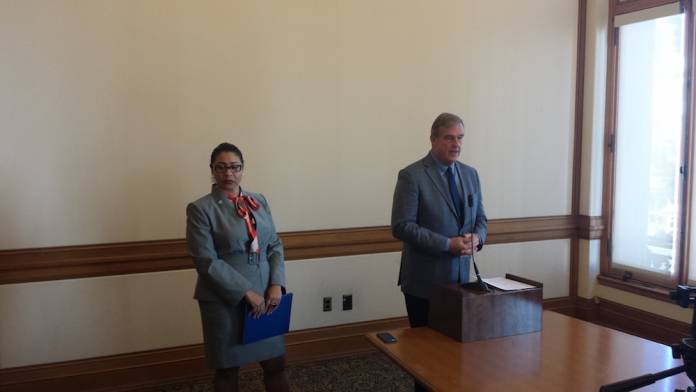
Supervisors Jeff Sheehy and London Breed held a press conference this morning to announce legislation that would provide legal assistance to tenants facing eviction – a clear response to a ballot measure that was filed less than two weeks ago.
That came a day after Sheehy announced the legislation at a D8 candidate debate.

But at this point, the press release, the statements at the press conference, and Sheehy’s comments at the debate are very different from the proposed legislation that has been sent to the city attorney. The sponsors aren’t on the same page. So it’s not clear what will emerge from the legislative process.
The plan was thrown together pretty quickly, after it became clear that the ballot measure had strong support in the city. Breed said today that an initiative was useless because it would be better to do the work at the board.
The two supervisors, later joined by Assemblymember David Chiu, announced they were planning “to protect tenants from fraudulent evictions through the provision of legal counsel for no-fault eviction cases.”
Breed told reporters that the right to counsel would be determined in part by a sort of means testing – people who made more than 60 percent of area median income might not be eligible.
Most evictions in San Francisco are not “no-fault” evictions. Many landlords create fake causes – things like “breach of lease,” which can be as minor as leaving a bicycle in the hall or hanging laundry out a window.
So according to the press release, those would not be covered in the new law.
Sheehy said at the debate that his measure wouldn’t provide counsel to tenants of nonprofit or public housing, and he told me after the press conference that since the city is subsidizing that housing, the taxpayers would by footing the bill for both sides in the legal process. Better, he suggested, to mandate mediation.
(The taxpayers, of course, pay for both sides in many criminal cases, since the district attorney and public defender both are funded by the city.)
But at the press conference, Breed said the bill would cover all tenants, including residents of buildings owned by nonprofits or public housing.
But a copy of the proposed legislation provided by Sheehy’s office late in the day is very different: It would apply to all tenants, with no means testing. It would provide full-scope representation starting no less than 30 days after a tenant gets an eviction notice.
And it would require the board to fund the program – at a cost Sheehy estimated at a little less than $4 million a year.
It’s clear that providing legal counsel to tenants facing eviction is way cheaper than providing services for people who have become homeless because of evictions. And it’s radically less expensive than building new housing.
But the politics of this are a little weird. Sheehy and Breed never spoke to anyone in the tenant community before introducing their bill (and although the original press release said “tenant advocates” would be at the press conference, only the three politicians were present.)
When I asked Breed about that, she said that the tenant groups had never contacted her or the other supes before launching their initiative.
Jon Golinger, who is running the initiative campaign, told me that the measure was still “full speed ahead.” He said that it’s still not clear what the actual legislation will say – and what might emerge from this Board of Supes and this mayor.
It’s pretty obvious that the event today was a political move; Sheehy is after all facing a challenge in June from Rafael Mandelman. The whole event was pulled together so quickly that even the participants weren’t on the same page.
Sheehy said he would like to get this done quickly, so it can be part of next year’s budget. But that assumes this board will pass the measure without watering it down so much that it will become worthless.
In which case, the initative is still headed for the June ballot.
Rent your neighbor’s car on Getaround. Sign up today, and enjoy $50 off your first trip: http://get.co/48h. [Sponsored]



I prefer this coming from the public that it is to serve, not from supervisors where there is no real transparency. I can see why those this idea was stolen from would be pissed. Also, Sonja, calm down, it’s pretty clear what’s in your pipe is your own ego. Not helpful to have a ego maniac running for office, I think we have one already…
Got to admit that those surveys are pretty dubious. However as far as stats go, they’re all we got. So its a fuzzy snapshot of sorts.
Not sure what you mean to distinguish “evicted wtht became homeless” vs “homeless that were evicted” – as homeless by definition wouldn’t be subject to a tenancy eviction.
IIRC, the number who were recently (less than a year) homeless was a significant % of the survey – 40%?
So says City data.
The percent who were evicted that became homeless would be different than the percent of homeless that were evicted. The denominators would be different. Also the homeless survey of 1,000 of the 7,000 homeless were biased toward temporarily homeless not chronic homeless. It is difficult to find and interview a drug addicted mentally ill person. It is very likely some who were evicted could be “homeless” before they found more permanent housing or left town.
Well, the http://hsh.sfgov.org/wp-content/uploads/2017/06/2017-SF-Point-in-Time-Count-General-FINAL-6.21.17.pdf
2017 Homeless Count gives a self-reported figure of 12% due to eviction.
Its curious that the homeless count was higher in 2002 (8640) than 2017 (7499). In 2002, they didn’t survey for ’cause’.
Evictions were, conversely, lower: 1486 vs 1798 (http://sfrb.org/sites/default/files/Document/Statistics/Annual%20Statistical%20Report%202016-2017.pdf). One might conclude that evictions lower the rate of homelessness by these figures, and therefore such legislation would be counter-productive to its stated purpose.
Why the need to demean me? Does it make you feel superior?
I should have put quotations for the paragraphs that were taken from the links. I was not commenting on rent control. The purpose was to show mom and pops were more than one percent. The NY Times link was from 2012.
Again, where did you get that information?
The data comes from minimizing a minority.
!% = 8500 “mom&pops” in SF. Now, many – though not most – will be in 2-4 units. The 2015 Housing Inventory http://default.sfplanning.org/publications_reports/2015_Housing_Inventory_Final_Web.pdf lists 79k units in that category. That would mean btw 20,000-40,000 bldgs (closer to the later, for if you look around, there are many duplexes in SF). But “mom-n-pops” also own larger blgds to, like 5 or 6 units. And “m-n-p’s” also own condoes and SFHs, but those aren’t currently covered by tenant protections FOR THE MOST PART. So, we are probably looking at 30,000 ppl that are landlords. Also, by definition, “m-n-p’s” would double the number of ppl. So Squirll is arguing that only 2000-4000 ppl are “m-n-p’s”; but m-n-p’s also have other family members too. So the actual figure is probably 10x Squirels amt.
Aw well, in the land of no-data, I guess the rodent is king.
Guess again Donny boy.
Says Donny.
Now that City College is free, you might want to take a reading comprehension class, then reread in order both your comments and mine.
I didn’t mention rent control, I was quoting the article. I was commenting on tenant protections. But I suppose the cause of those protections are rent control because rent control is an incentive to evict. The NY Times article that said 30% was from 2012. What data do you have that show’s one percent?
You mean, it would be ‘dirt cheap’ to provide that small # of people with represention, don’t you.
1%? Really? Sounds like medical marijuana mind.
A link from a publication called “modern luxury”–quite telling. Articles from 2003 vs. data on today’s city wide/state wide/nation wide housing crisis of affordability. Developers, realtors and millionaire property owners will oppose the legislation. 2003 was almost 15 years ago. GW Bush took us to war in Afghanistan and Iraq in 2003.
Oh, I just thought from your original comment that we were playing make-believe. And maybe we are, based on your last sentence here about rent control. Btw, the “extraordinarily wealthy” can already afford their own attorney, and would most likely choose to pay for one, even if this passes without means testing. Wealthy defendants in criminal cases almost never use a public defender.
And yes, a lot has changed since 2003.
Where did you get that information? I know that tenant protections have been driving mom and pop out of the landlord business, but it has been that much?
This is like an arms race so I would guess most mom and pop landlords can’t keep up and sell out to hardhearted professionals.
However, from what I can tell the percent mom and pop is much higher than one percent.
A 2003 study (old, but still the most recent solid data available) found that 75 percent of landlords in the city owned fewer than 10 units; 42 percent lived in a building that they rented out. They were also much more likely to manage their own rental properties than landlords nationwide, increasing the potential for friction with their tenants, and they held on to those buildings longer—three decades was not unusual. An estimated 80 percent of rent-controlled properties in San Francisco are mom-and-pop owned.
https://www.modernluxury.com/san-francisco/story/sympathy-the-landlord?page=2
An estimated 30 percent of the city’s rental properties owned by mom-and-pop investors with four units or less, an unintended consequence of rent control is becoming more prevalent: people of relatively modest means subsidizing the housing of the extraordinarily wealthy.
http://www.nytimes.com/2012/02/17/us/san-francisco-rent-control-and-unintended-consequences.html
Only one percent of landlords in San Francisco are “mom and pop.” So, no need to provide them with representation.
What about landlords right to an attorney if the State is the prosecutor. Most professional landlords have no problem defending themselves, but it could financially ruin mom and pop.
The legislation would not accomplish much. There are not that many no-fault evictions and most of them are not low-income. There are hardly any in BVHP. Nor will it impact homelessness as one percent of all those evicted, including just cause, end up “homeless.”
You are conflating “cause” with “fault.” There are just causes in the rent ordinance that don’t require wrongdoing by the tenant, i.e. owner move-in, demolition and Ellis Act. And I agree that tenants should have a right to attorney for fault cases because these are often trumped up and all about replacing longterm tenants with market rate ones.
Huh?
Breed and Sheehy are scrambling to look good and undermine progressives, who they see as opponents. They are bumbling Keystone Cop Supervisors.
In San Francisco almost all evictions require just cause, which means they aren’t technically no-fault evictions. More importantly, though, tenants in non-payment or breach of lease cases often have defenses that should be litigated.
I would guess most no fault evictions would not meet the means test. There are hardly any no-fault evictions in low income areas.And there are not that many no-fault evictions so begin with.
Maybe 1% of those evicted become homeless.